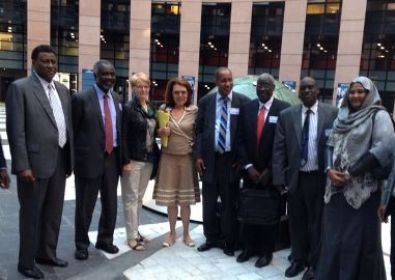Sudan’s opposition leaders blocked from travelling to France
June 8, 2015 (KHARTOUM/PARIS) – Sudanese opposition leading members said on Monday that security authorities had barred them from travelling to France for a hearing with the European Union (EU) parliament.

The EU parliament organize a hearing in Strasbourg France for the “Sudan Call” forces including the coalition of the National Consensus Forces (NCF), National Umma Party (NUP), the rebel alliance of the Sudanese Revolutionary Forces (SRF) and civil society groups.
The hearing which will take place on Tuesday 9 June will discuss the prospects for peace and democratic reforms after the general elections and position of the political and armed forces on how to achieve it.
The security service at the Khartoum airport retained the passports of NUP deputy-presidents Meriam al-Mahdi and Mohamed Abdalla al-Doma, a member of the Sudanese Communist Party’s (SCP) central committee Siddig Yousif, a leading member of the Ba’ath Party Fatehi Nourri.
In a WhatsUp message sent in the early hours of Monday morning after the travel ban, al-Mahdi said the Sudan Call forces will hold a press conference at the SCP premises in the afternoon.
On Saturday, the security agents prevented a splinter member of the ruling National Congress Party, Farah Agar from travelling to Paris to take part in the meeting. Also, NCF leader Farouk Abu Issa and his wife were barred from taking a flight to Cairo for medical treatment on Wednesday.
The opposition leader was also invited to take part in the EU hearing.
The NUP leader Sadiq al-Mahdi who resides in Cairo will participate in Strasbourg meeting.
Also, delegations of the SRF groups are already in Paris for the hearing.
Last December, Sudanese government arrested Abu Issa, a prominent rights activist Amin Mekki Mandani and Farah for four months after meeting with the rebel groups in Addis Ababa where they signed the “Sudan Call” declaration.
However, Khartoum authorized the opposition forces to fly to Berlin in February 2015 to participate in a meeting sponsored by the German government. In their Berlin Declaration the opposition groups expressed their readiness to participate in a preparatory meeting for the national dialogue.
SRF MEETS IN PARIS
The leadership of the rebel umbrella is expected to issue a statement on Monday before to head for Strasbourg when they conclude a three-day meeting in Paris.
The meeting of the rebel factions discusses issues related to the SRF leadership structures, ways to coordinate political actions with the Sudan Call forces and Strasbourg meeting with the EU lawmakers.
It is not clear if the representatives of the political parties and the rebel groups will meet in France on the sidelines of the European Parliament hearing.
Following the failure of the African Union mediation to hold the pre-dialogue meeting last March; the Sudan Call forces called for a new approach and proposed to discard the national dialogue. They further suggested to initiate a new process involving the international community.
The ruling party in Khartoum and the opposition Popular Congress Party say they are hostile to any foreign participation in the resolution of Sudanese conflicts, stressing such process should be 100% inter-Sudanese and take place inside the country.
(ST)
